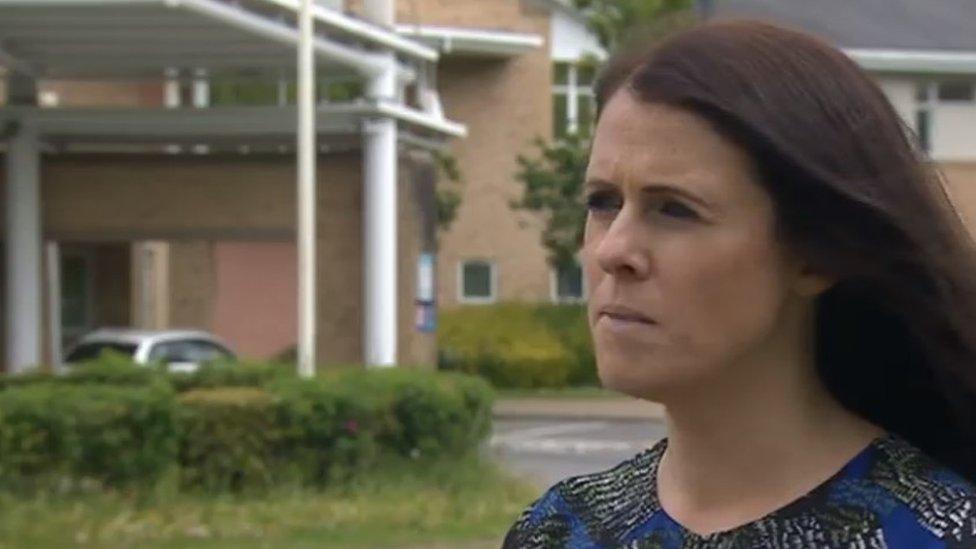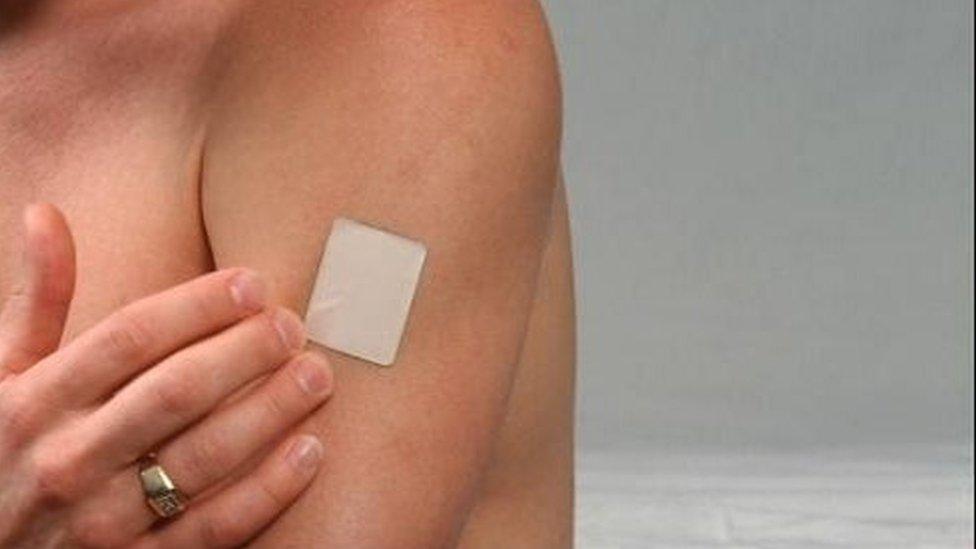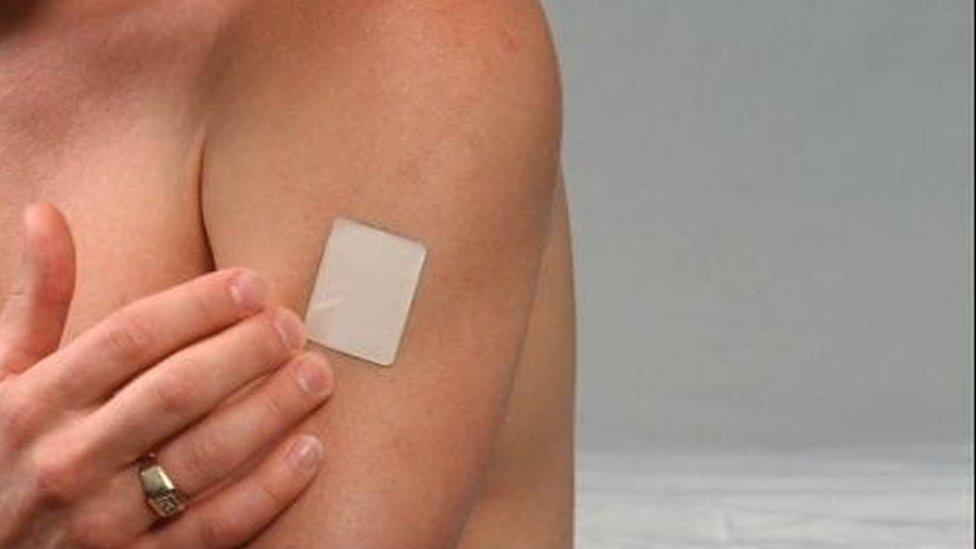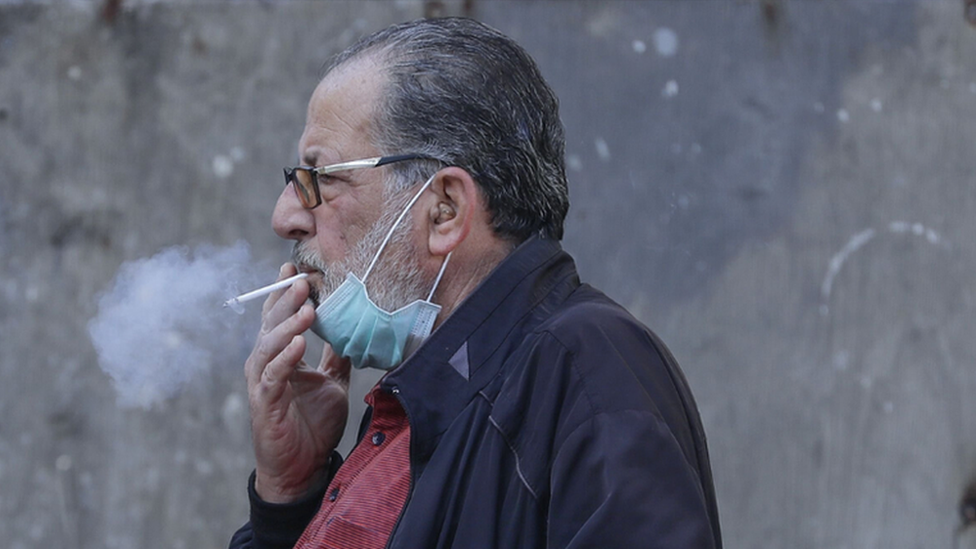Coronavirus: Can nicotine replacement products help combat Covid-19?
- Published

Tests to see if nicotine patches and other quit-smoking aids can help combat coronavirus have been called for by a group of Welsh doctors.
The three hospital consultants had already written in the British Medical Journal, external for investigations to be "urgently considered" to see if patches can help the body stop Covid-19.
French researchers are testing patches on coronavirus patients, external and France has subsequently limited their sale.
Now the Welsh doctors want more tests.
As trials continue in France, the consultants based in the south Wales valleys want to see what effect all nicotine replacement therapies, including gums, lozenges and nasal sprays, can have on people with coronavirus.
Funders of new drugs are to be contacted on the group's behalf by one of the UK's top anaesthetists in a bid to trial the theory in Wales.
Last month, data from a Paris hospital indicated that smokers were statistically less likely to be admitted for treatment for Covid-19.
But the Welsh doctors have issued a strong non-smoking message and urged smokers to quit, saying if they catch the virus they are far more likely to die from it.

A SIMPLE GUIDE: How do I protect myself?
AVOIDING CONTACT: The rules on self-isolation and exercise
HOPE AND LOSS: Your coronavirus stories
LOOK-UP TOOL: Check cases in your area
TESTING: Can I get tested for coronavirus?

The Welsh doctors work in the Cwm Taf Morgannwg health board area, which includes Rhondda Cynon Taff.
This has the highest death rate in Wales, as well as the highest proportion of positive cases per 100,000 of population.

What is the thinking behind it?

Dr Nerys Conway is one of the consultants wanting more investigation
"The physiology is immensely complicated but basically nicotine and Covid are involved with very similar pathways," said trauma consultant Jonathan Davies.
"The thought is that the virus binds to receptors in your upper airways and we know that nicotine binds to the same receptors. So can nicotine block the virus from the attack, so to speak?
"So nicotine replacement products may have a role in preventing infection by blocking the receptor in the airways which the virus binds to - but this is speculative."
Mr Davies together with two colleagues at the Royal Glamorgan Hospital in Llantrisant - Dr Nerys Conway, a consultant respiratory physician, and Dr Robert Davies, a consultant anaesthetist - suggested the possible role for nicotine replacement drugs in treating Covid-19 in the BMJ on 20 March.

France has banned online sales of nicotine products
"It's a question for the scientists - and tests to be done to see if this is just a theory or a plausible hypothesis."
Mr Davies and other medical experts across Wales like Prof Judith Hall, one of the country's leading anaesthetics and intensive care medicine consultants at Wales' biggest hospital, to investigate getting possible authorisation and funding for trials.
Prof Hall, who has an OBE for her services to medicine, has a proven track record of obtaining grants for research and the Cardiff University School of Medicine Professor has said she will help the group bid for funding.
"The question is can nicotine block the virus entering the body?" said Prof Hall, consultant anaesthetist at Cardiff's University Hospital of Wales.
"The virus could be entering through our proxy system or through the lungs so this research is an interesting idea. It will be very complicated to investigate but it is worth looking at."
A trial of a coronavirus vaccine has started in Oxford and Prof Hall said get immunisation for this "slippery virus" may not be "straight forward or immediate."
So the team at Cwm Taf Morgannwg University Health Board - which covers the Rhondda Valleys, Bridgend and Merthyr Tydfil - hope that their tests will be considered by funders of research.
"There are all initial observations but nicotine is actually quite a powerful, physiological drug and if it effects the same pathways and receptors as a virus and then you start to think," added Mr Davies.
"So it would be pertinent to trial and test it."
The expert have strongly warned, however, against people turning to smoking because of any speculative links between nicotine and combating Covid-19.
"The advice which I and I am sure all doctors would give unequivocally is that smokers should give up immediately as if they catch the disease they are far more likely to die from it," he said.
"What we are suggesting is that people certainly should give up but its possible that they maybe better to do so using a course of patches. I would add that at present there is no suggestion either that non smokers should suddenly rush out and buy patches as has happened in France.
"It would be a disaster if people misinterpreted this and the French work as a green light to smoke. The advice is the complete opposite."
- Published24 April 2020

- Published23 April 2020
